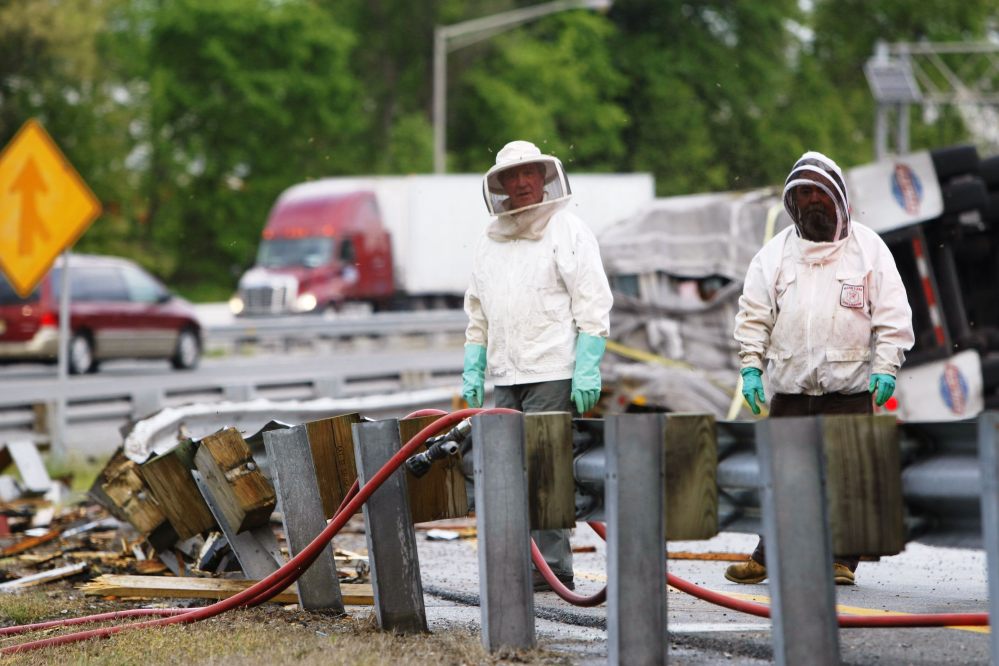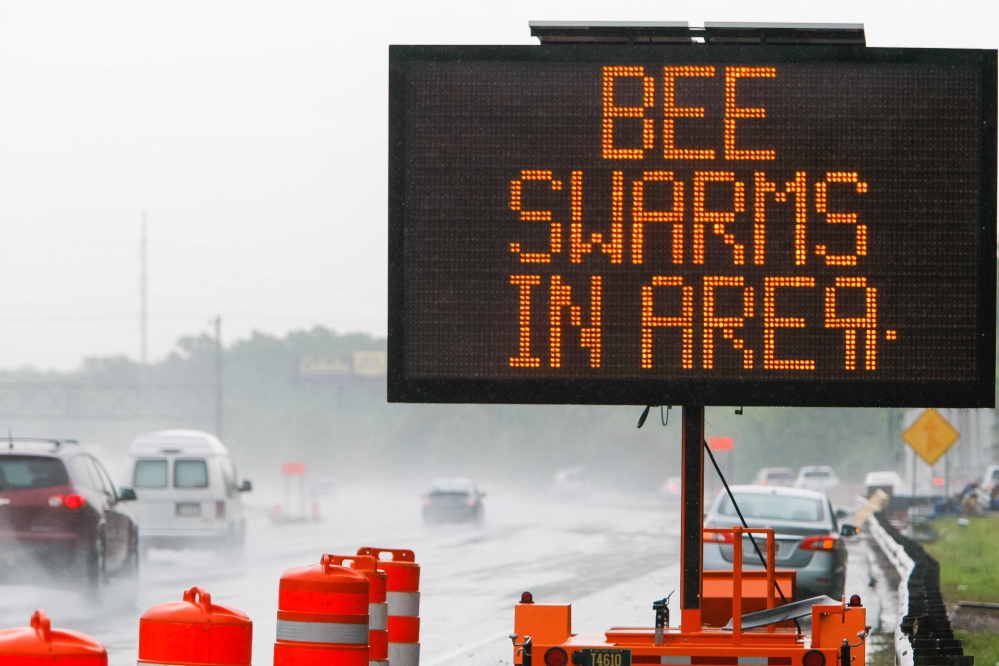A tractor-trailer that spilled a load of 16 million to 20 million honeybees when it rolled over in Delaware this week was headed for blueberry fields Down East.
The shipment of 460 crated hives originated in Florida, carrying bees that were to pollinate fields owned by Allen’s Blueberry Freezer Inc. of Ellsworth. The tractor-trailer overturned on the sharp curve of an on-ramp to Interstate 95 near Newark, just after 6 p.m. Tuesday.
The crash affected just a small fraction of the bees that will be brought into Maine to pollinate crops starting with blueberries this month. Maine’s apiarist and bee inspector, Anthony Jadczak, said commercial farmers are expected to import about 75,000 to 80,000 hives this year.
Beekeepers send their hives around the country over the course of the year, to be rented by farms that depend on honeybees to pollinate crops.
About half of the hives from the truck that overturned were salvaged, according to the bees’ owner, Pollination US Inc., based in Felda, Florida.
The highway on-ramp was closed for 13 hours as firefighters tried to disperse the bees and local beekeepers worked to recover as many hives as possible.
“You can imagine you can’t round up 20 million bees,” said Delaware’s state police spokesman, Sgt. Paul Shavack. “We couldn’t get to the truck to get the ramp open or inspect the truck at all.”
On Wednesday, firefighters turned to using soapy water foam to kill the remaining bees so the rest of the debris could be cleaned up.
Shavack said it was the first time that Delaware’s state police used its official honeybee swarm removal plan.
“It’s a plan that’s been in place since 1995,” he said. “It contains a current list of bee handlers and keepers in each county throughout the state to respond to an incident like this.”
Lynette Miller, spokeswoman for the Maine Emergency Management Agency, said Maine’s response plan for a major bee release entails calling Jadczak.
Jadczak was summoned when a truck rollover released 20 million bees in Falmouth on Mother’s Day in 1999.
In Delaware, the driver of the truck, Adolpho Guerra, 55, of Miami, and two passengers were taken to Christiana Hospital with minor injuries from the crash and 50 to 100 stings each, police said. Public safety officials said the men climbed out of the truck and ran down the road, covered with bees. There were also reports of passers-by also being stung, according to The Wilmington News Journal in Delaware.
Police eventually charged Guerra with failing to properly secure the load, which allowed the hives to shift to one side as the truck turned.
Steven Eisele, who owns Pollination US, said his company had been shipping bees for 20 years without any accidents. “This was our first incident,” he said.
The bees were being moved by Odilia’s Express Inc. of Miami Beach.
Eisele praised firefighters for initially using water to calm the bees so some could be recovered, rather than using chemicals that would have killed them all. He said about half of the bees survived and were taken to another site until a company representative could check on them.
“It’s very difficult on the hive to go through something like this, just as it would be hard on a person to have an accident,” he said.
The total value of the truck and cargo was about $250,000, including the bees, the hives and the revenue from renting the bees, Eisele said.
The truckload had been contracted for two pollinations in Maine. Officials from Allen’s Blueberry Freezer would not comment on the incident Wednesday.
Road crews spent Wednesday cleaning up broken hives and debris. Dumpsters loaded with the broken hives had to be saturated with foam to kill the swarms of bees that remained on them.
Some of the bees that were released were swarming on nearby roads, prompting state transportation officials to activate message boards with warnings telling motorists to “Keep windows closed” and “Bee swarms in area.”
In the accident in Falmouth in 1999, police determined that the driver was going too fast on a tight, 25 mph turn connecting the Maine Turnpike spur to Interstate 295 northbound and lost control, spilling 400 hives.
Most of the hives were crushed. Emergency officials killed the bees after concluding that it would take days to try to recover the broken hives. The ramp would have had to remain closed, officials said at the time, with the cloud of honeybees hovering around the overturned trailer to stay near the hives.
Jadczak, who was the state’s beekeeper at the time, was joined by assistants in protective gear who burned pine needles to create smoke and quiet the bees.
Falmouth firefighters sprayed a fine mist of water over the wreckage to simulate rain and make the bees cluster around the hives. The bees were then killed by a spray of a fire suppression formula similar to soapy water.
Michael Shutts, a planner with the Cumberland County Emergency Management Agency, said the county doesn’t have a specific bee swarm response plan, but does have a general hazard response plan.
Much of that planning refers to hazardous materials, and bees do not appear in the Department of Transportation’s list of hazardous materials.
David Hench can be contacted at 791-6327 or at:
Twitter: @Mainehenchman
Jessica Hall can be contacted at 791-6316 or at:
jhall@pressherald.com
Twitter: @JessicaHallPPH
Send questions/comments to the editors.




Success. Please wait for the page to reload. If the page does not reload within 5 seconds, please refresh the page.
Enter your email and password to access comments.
Hi, to comment on stories you must . This profile is in addition to your subscription and website login.
Already have a commenting profile? .
Invalid username/password.
Please check your email to confirm and complete your registration.
Only subscribers are eligible to post comments. Please subscribe or login first for digital access. Here’s why.
Use the form below to reset your password. When you've submitted your account email, we will send an email with a reset code.